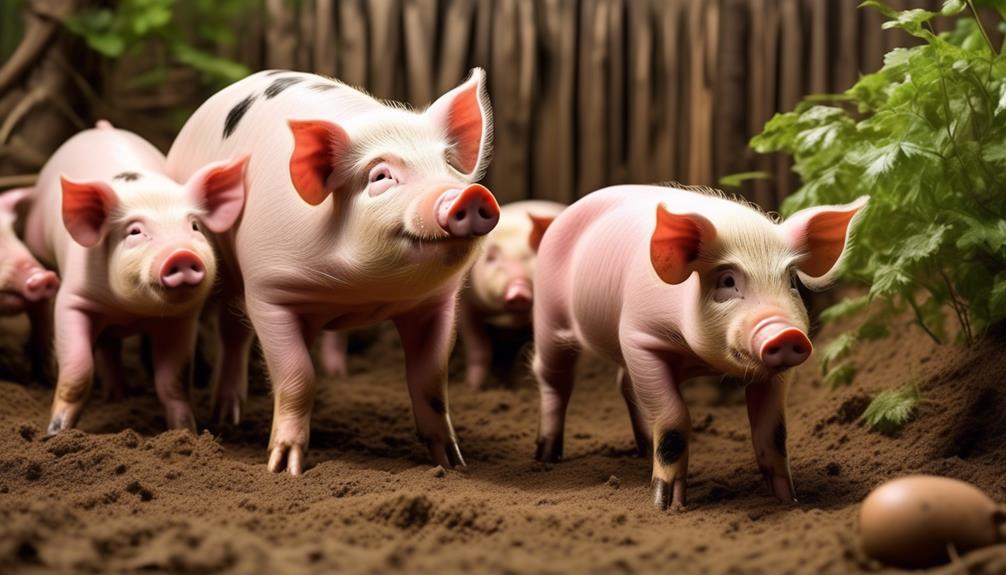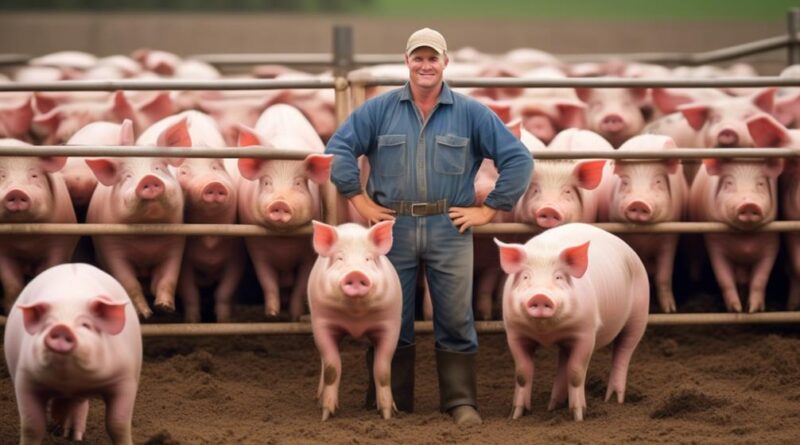8 Best Solutions for Aggressive Pig Behavior
If you've ever found yourself trying to tame a wild stallion, you'll understand the challenge of dealing with aggressive pig behavior.
These intelligent and social animals can present a range of challenging behaviors that require careful consideration and proactive solutions.
From environmental factors to training techniques, there are several strategies that can help you navigate the world of pig behavior and foster a more harmonious relationship with these fascinating creatures.
But what exactly are the best solutions for managing aggressive pig behavior?
Let's explore some insightful approaches that can make a meaningful difference in your interactions with these animals.
Understanding Aggressive Pig Behavior
If your pigs are displaying aggressive behavior, it's important to understand the reasons behind their actions in order to address the issue effectively. Understanding aggression triggers can be crucial in identifying the root cause of the behavior. Aggression in pigs can be triggered by various factors such as fear, dominance, territoriality, or even pain. Observing their behavior and identifying specific triggers can help in developing a targeted approach to address the aggression.
Behavioral modification techniques can be employed to mitigate aggressive behavior in pigs. Positive reinforcement training, socialization, and providing environmental enrichment can help in redirecting their behavior. Effective communication through consistent training and reinforcement of desired behaviors can aid in curbing aggressive tendencies. Additionally, stress management techniques such as providing a secure and comfortable environment, maintaining a stable routine, and ensuring proper nutrition can contribute to reducing aggression in pigs.
It's important to keep in mind that aggression in pigs can also be influenced by their natural instincts and social dynamics within the group. Understanding their natural behavior and social structure can assist in managing and preventing aggressive encounters. By addressing the underlying triggers and implementing appropriate behavioral modification and stress management techniques, you can effectively manage and reduce aggressive behavior in your pigs.
Providing Adequate Space and Environment
To address the aggressive behavior in your pigs, ensuring they have adequate space and a suitable environment is essential for their well-being and overall behavior management. Providing sufficient space and environmental enrichment can greatly contribute to reducing aggressive tendencies in pigs.
- Space Management: Evaluate the space available to your pigs and ensure that it meets the recommended standards for pig housing. Overcrowding can lead to stress and aggression among pigs, so providing enough space is crucial for their well-being.
- Environmental Enrichment: Implement environmental enrichment strategies such as providing objects for rooting, exploring, and playing. This can help alleviate boredom and reduce aggressive behaviors in pigs by allowing them to engage in natural behaviors.
- Behavioral Modification and Socialization Techniques: Implement behavioral modification techniques and socialization strategies to help pigs learn appropriate social behaviors and reduce aggression. This may include positive reinforcement training and introducing pigs to new social groups gradually.
Implementing Proper Feeding Practices
Proper nutrition and a well-structured feeding schedule are essential for managing aggressive behavior in pigs. It's crucial to provide a well-balanced diet that meets the specific nutritional needs of your pigs. Consult with a veterinarian or animal nutritionist to develop a feeding plan that includes the right combination of protein, carbohydrates, vitamins, and minerals. Ensure that the feed is easily accessible to all pigs to prevent competition and aggression during feeding times.
Establishing a consistent feeding schedule is equally important. Pigs thrive on routine, so it's beneficial to feed them at the same times each day. This helps reduce stress and minimizes the likelihood of aggressive behavior stemming from food anticipation or hunger. Implementing a structured feeding schedule also allows for better observation of the pigs' behavior around feeding times, enabling early detection of any signs of aggression that may need to be addressed.
Furthermore, consider the physical layout of the feeding area. Providing ample space and multiple feeding stations can help reduce competition and aggression during meal times. Ensure that each pig has enough space to eat without feeling threatened by others.
Utilizing Positive Reinforcement Training
When training pigs to address aggressive behavior, utilize positive reinforcement techniques to encourage desired behaviors and discourage aggressive tendencies. Positive reinforcement involves providing a reward or incentive to reinforce a specific behavior, making it more likely to occur in the future.
Here are some effective ways to implement positive reinforcement training techniques for behavior modification in pigs:
- Clicker Training: Use a clicker as a reinforcement tool to signal to the pig when it has performed the desired behavior. Pair the sound of the clicker with a treat or reward to create a positive association and reinforce good behavior.
- Food Rewards: Utilize favorite treats such as fruits or vegetables to reward the pig for displaying non-aggressive behaviors. By associating positive actions with food rewards, the pig will be motivated to repeat those behaviors.
- Consistency in Reinforcement: Ensure that positive reinforcement is consistently applied whenever the pig displays the desired behavior. Consistency helps the pig understand what's expected and reinforces the connection between the action and the reward.
Addressing Health and Medical Issues
How can you identify and address potential health and medical issues that may contribute to aggressive behavior in pigs?
It's crucial to monitor your pig's diet for any dietary restrictions that could be causing discomfort or deficiencies. Ensure they've access to a balanced and nutritious diet that meets their specific needs. Inadequate nutrition can lead to irritability and aggressive behavior, so consulting with a veterinarian or animal nutritionist to develop a suitable feeding plan is essential.
In addition to dietary considerations, it's important to be attentive to any signs of illness or discomfort that could be triggering aggressive behavior. Regular veterinary check-ups can help in identifying and addressing any underlying health issues. Pigs may exhibit aggressive behavior if they're in pain or suffering from an undiagnosed medical condition.
Behavioral modifications can also play a crucial role in addressing aggressive behavior stemming from health and medical issues. Training and socialization can help reduce stress and anxiety in pigs, thereby minimizing the likelihood of aggressive behavior. Implementing positive reinforcement techniques, such as rewarding calm and non-aggressive behavior, can be effective in reshaping their responses to various stimuli.
Establishing Clear Dominance Hierarchy
To address aggressive behavior in pigs, establishing a clear dominance hierarchy within the herd is essential for maintaining order and reducing conflicts. When it comes to establishing boundaries and leadership roles within the pig herd, there are several key strategies to consider:
- Structured Feeding: Implement a structured feeding routine where dominant pigs are fed first, followed by subordinate pigs. This helps reinforce the hierarchy and allows pigs to understand their rank within the group.
- Encouraging Natural Interactions: Allowing pigs to interact and socialize in a natural setting can help establish dominance more organically. Providing adequate space and resources encourages pigs to establish their own hierarchy through natural behaviors.
- Consistent Human Interaction: Regular and consistent interaction with humans can also help reinforce the established dominance hierarchy. By consistently enforcing the hierarchy during human interactions, pigs can better understand their roles within the herd.
Utilizing Enrichment Activities

You can enhance the well-being and reduce aggression in pigs by incorporating enrichment activities that stimulate their natural behaviors and cognitive abilities. Mental stimulation is crucial for pigs as it helps keep their minds active and engaged, reducing the likelihood of aggressive behaviors. Providing enrichment activities that encourage problem-solving, such as puzzle feeders or hiding treats for them to find, can help fulfill their natural instincts and prevent boredom, which is often a precursor to aggressive behavior.
Social interactions also play a vital role in the well-being of pigs. It's essential to provide opportunities for pigs to engage with each other, as it mimics their natural social structures and behaviors. Enrichment activities that encourage positive social interactions, such as group feeding or communal resting areas, can help reduce stress and aggression within the group. Additionally, rotating pigs between different groups can provide them with mental stimulation through the introduction of new social dynamics and hierarchies.
Incorporating enrichment activities into a pig's daily routine is a proactive approach to managing aggressive behavior. By providing mental stimulation and opportunities for positive social interactions, you can help address the underlying causes of aggression while promoting overall well-being in pigs.
Seeking Professional Behavioral Consultation
When addressing aggressive pig behavior, consulting with a professional behaviorist can provide valuable insights and tailored strategies for managing and mitigating the issue. Seeking professional intervention is essential for addressing severe behavioral problems in pigs. Here are three reasons why professional behavioral consultation is crucial:
- Expert Assessment: A professional behaviorist can conduct a comprehensive assessment of the pig's behavior to understand the triggers and underlying causes of aggression. This thorough evaluation is crucial for developing an effective behavioral modification plan.
- Tailored Strategies: Professional intervention enables the development of customized strategies to address the specific aggressive behaviors exhibited by the pig. These tailored approaches can encompass environmental changes, training techniques, and behavioral modification programs designed to reduce aggression and promote positive behavior.
- Ongoing Support: Behaviorists offer ongoing support and guidance throughout the behavioral modification process. This continuous assistance is vital for monitoring progress, making necessary adjustments to the intervention plan, and ensuring that the pig's behavior improves over time.
Seeking professional behavioral consultation isn't only beneficial for the well-being of the pig but also for the safety of handlers and other animals. By enlisting the expertise of a professional behaviorist, you can gain access to specialized knowledge and resources that are essential for effectively managing and modifying aggressive pig behavior.
Frequently Asked Questions
Can Aggressive Pig Behavior Be Influenced by the Breed of the Pig?
Yes, the breed of a pig can influence aggressive behavior. Genetics play a role in determining temperament. Some breeds may have a predisposition towards aggression. Understanding the breed's characteristics can help in managing aggressive pig behavior.
What Are Some Common Signs of Aggression in Pigs That Owners May Overlook?
You may miss common triggers like ear flattening, raised hackles, and charging. Recognize aggressive tendencies and adjust handling. Properly managing stress, fear, and social dynamics can help reduce aggressive behaviors in pigs.
Are There Specific Age Ranges When Pigs Are More Prone to Aggressive Behavior?
As pigs mature, they may exhibit aggressive behavior influenced by various triggers. Understanding pig maturity and recognizing behavioral triggers can help you manage and mitigate aggressive behavior in pigs at different age ranges.
How Can Environmental Factors, Such as Weather or Noise, Impact a Pig's Aggression?
Weather and noise can greatly impact a pig's aggression. Socialization and proper housing play roles. Ensuring dietary needs are met can also help. Examine how these factors affect your pigs to address any potential aggression issues.
Are There Any Natural Remedies or Supplements That Can Help Reduce Aggressive Behavior in Pigs?
Looking to reduce aggressive pig behavior? Natural remedies and herbal supplements, along with behavior modification and training techniques, can help. Consider exploring options like calming herbs and positive reinforcement to address aggressive behavior in pigs.
Conclusion
In conclusion, addressing aggressive pig behavior requires a combination of understanding, proper care, and professional consultation.
By providing a suitable environment, training with positive reinforcement, and addressing any health issues, you can help mitigate aggressive behavior in pigs.
It's important to establish clear dominance hierarchy and provide enrichment activities to keep them mentally and physically stimulated.
Don't hesitate to seek professional help if needed, to ensure the well-being of your pigs.
